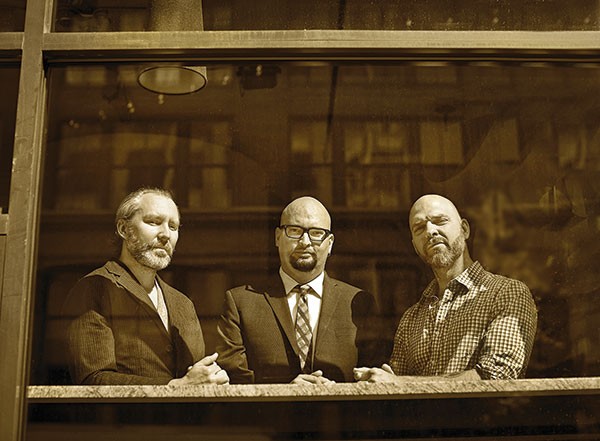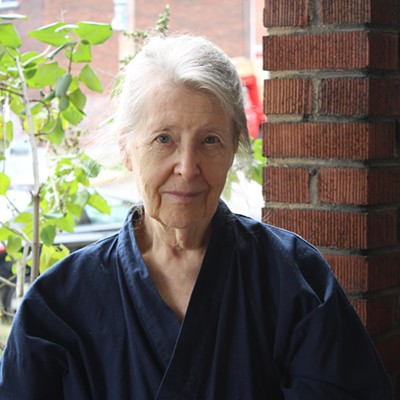The Bad Plus takes the traditional piano trio configuration in adventurous directions
“We try to do it in a way that feels like this is our music, this is our time.”

The Bad Plus (Dave King, right)
THE BAD PLUS with DAVID THROCKMORTON
7:30 p.m. Fri., July 8. South Park Amphitheater, South Hills. Free. 800-581-9145 or alleghenycounty.us
The Bad Plus landed in the spotlight when Columbia released These Are the Vistas, in 2003. Between compositions by each member of the piano trio, the band reworked Blondie, Aphex Twin and Nirvana. The jazz press, always eager to find the genre’s next savior, had a field day. Even the mainstream music press took notice.
That didn’t sit well with the band. “We did not feel we were the saviors of anything. We never had that discussion,” says drummer Dave King, from Minneapolis, where the band first formed. The band “felt grotesquely uncomfortable with the idea that we saved anything. There was nothing to be saved. We love jazz.”
Besides, this was no overnight sensation. The Bad Plus was 3 years old with two independent releases to its name by the time Vistas dropped. Since then, the group has continued to walk the line between bold originals and a dizzying choice of interpretations, from Pink Floyd and Yes to Stravinsky’s entire Rites of Spring. The most recent album teamed the trio with straight-ahead saxophonist Joshua Redman. What might have seemed like a band putting an irreverent spin on music now comes across as a band bringing any number of styles to modern jazz.
King says that from the beginning he and bandmates Ethan Iverson (piano) and Reid Anderson (bass) wanted to take the classic jazz piano trio into another direction. “There are three composers in the band. It is not the piano leading the band. So there is no piano-centric piano-trio energy,” he says. “It’s very dialogue-based. There are also very large dynamic swings, which piano trios are not known for.”
The Bad Plus were never intent on dismantling the jazz canon, unlike the New York quartet Mostly Other People Do the Killing, which takes a more flippant approach to classic jazz, including Blue, a note-for-note reinterpretation of Miles Davis’ Kind of Blue. The Bad Plus performs with an infectious enthusiasm, as witnessed during its 2007 set at the Manchester Craftsmen’s Guild. But artistically, everything is fair game.
“The concept is based on [the idea that] everyone in that band can pretty much play anything they want to,” King says of the group’s approach. “So in a way, we have the technical freedom to play whatever anyone brings in, from contemporary classical music, to a standard, to pop music to dense meta-rhythms to straight minimalism to backbeats to swing, whatever. But we try to do it in a way that feels like this is our music, this is our time.”
The group has sustained a solid career, rising above the initial publicity, earning respect along the way. “We’ve noticed there’s a lot of naysayers from the early days who actually came around, because we stuck with what we do and waded through those waters of being hyped and, we believed, showing the depths of what we’ve always been. Which is a much more complex situation than guys playing ‘Smells Like Teen Spirit,’” King says, adding: “If you read just one article [about us] in 2003 — I might be suspect myself.”
That didn’t sit well with the band. “We did not feel we were the saviors of anything. We never had that discussion,” says drummer Dave King, from Minneapolis, where the band first formed. The band “felt grotesquely uncomfortable with the idea that we saved anything. There was nothing to be saved. We love jazz.”
Besides, this was no overnight sensation. The Bad Plus was 3 years old with two independent releases to its name by the time Vistas dropped. Since then, the group has continued to walk the line between bold originals and a dizzying choice of interpretations, from Pink Floyd and Yes to Stravinsky’s entire Rites of Spring. The most recent album teamed the trio with straight-ahead saxophonist Joshua Redman. What might have seemed like a band putting an irreverent spin on music now comes across as a band bringing any number of styles to modern jazz.
King says that from the beginning he and bandmates Ethan Iverson (piano) and Reid Anderson (bass) wanted to take the classic jazz piano trio into another direction. “There are three composers in the band. It is not the piano leading the band. So there is no piano-centric piano-trio energy,” he says. “It’s very dialogue-based. There are also very large dynamic swings, which piano trios are not known for.”
The Bad Plus were never intent on dismantling the jazz canon, unlike the New York quartet Mostly Other People Do the Killing, which takes a more flippant approach to classic jazz, including Blue, a note-for-note reinterpretation of Miles Davis’ Kind of Blue. The Bad Plus performs with an infectious enthusiasm, as witnessed during its 2007 set at the Manchester Craftsmen’s Guild. But artistically, everything is fair game.
“The concept is based on [the idea that] everyone in that band can pretty much play anything they want to,” King says of the group’s approach. “So in a way, we have the technical freedom to play whatever anyone brings in, from contemporary classical music, to a standard, to pop music to dense meta-rhythms to straight minimalism to backbeats to swing, whatever. But we try to do it in a way that feels like this is our music, this is our time.”
The group has sustained a solid career, rising above the initial publicity, earning respect along the way. “We’ve noticed there’s a lot of naysayers from the early days who actually came around, because we stuck with what we do and waded through those waters of being hyped and, we believed, showing the depths of what we’ve always been. Which is a much more complex situation than guys playing ‘Smells Like Teen Spirit,’” King says, adding: “If you read just one article [about us] in 2003 — I might be suspect myself.”













